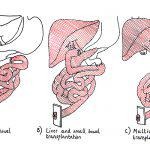What is an Intestinal Transplant?
The digestive tract breaks food down into small pieces and is divided into several parts. Each part has a special purpose. Most people can live without a stomach or large intestine, but it is harder to live without a small intestine due to the inability to absorb the nutrients from your diet. When the intestine is unable to digest or absorb fluid, electrolytes, and nutrients sufficient to meet the requirements of an individual we call it an intestinal failure.
Intestine transplantation, intestinal transplantation, or small bowel transplantation is the surgical replacement of the small intestine for chronic and acute cases of intestinal failure
Causes for Intestinal failure:
- Ischemia
- Crohn’s Disease
- Motility Disorder
- Tumor
- Volvulus
Intestinal transplantation is suggested when the projected long-term survival in a patient with intestinal failure is clearly better with transplantation. Intestinal transplantation is the surgical replacement of the small intestine for chronic and acute cases of intestinal failure.
Suitable Intestine Donors:
The standard intestinal donor can be a brain-dead donor. They are highly preferable donors because they exhibit maintainable cardiac, endocrine, excretory function and adhering to the characteristics of size match, donor age, tissue quality, and ABO compatibility.
There are three main types of Intestinal Transplant:
- Isolated Intestine transplant
- Combined Liver and Intestine transplant
- Multivisceral transplant
Post-Transplant:
The post-transplant care of the intestinal transplant recipient is challenging. Special care is taken post-surgery to minimize the risk of infection. Anti-rejection drugs are advised, proper nutritional diet and lifestyle modifications are most important.
Advantages of Intestine Transplant:
- Better quality life
- No longer relying on other treatments
- Better life expectancy
- Ability to resume some regular activities













